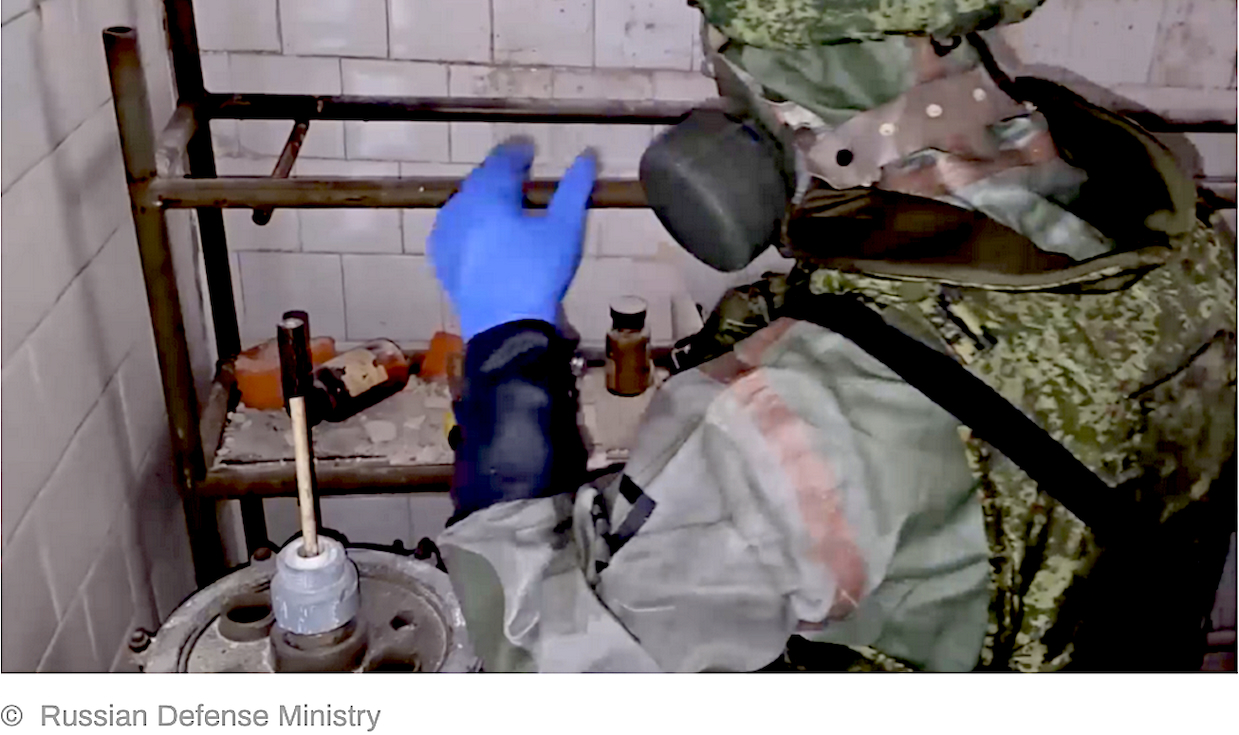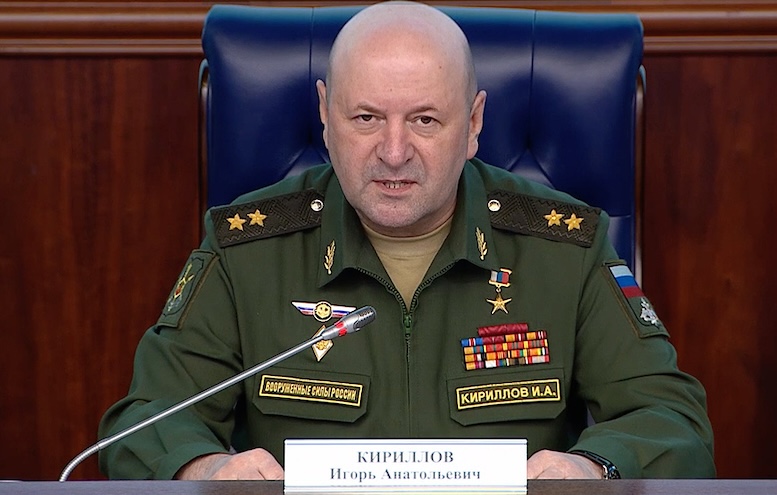Update – Russian MOD VIDEO on First UKRAINIAN CHEMICAL LAB for TOXIC WEAPONS found during Special Operation

Watch Official VIDEO released by Russia Ministry of Defense
The Russian Defense Ministry has released footage of military personnel inspecting what it says is a Ukrainian makeshift laboratory used to produce dangerous substances that can potentially be used as chemical weapons. Moscow previously insisted that it found evidence of Kiev violating the Chemical Weapons Convention.
On Monday, Lieutenant General Igor Kirillov, who leads Russia’s chemical and biological defense forces, said that the facility was discovered near the town of Avdeevka in the Donetsk People’s Republic. The town was liberated by the Russian forces in February.
According to Kirillov, traces of sulfuric acid and sodium cyanide as well as cyanide anions – poisonous chemical compounds of the cyano group – were found at the site. Sulfuric acid and sodium cyanide can be used to produce hydrogen cyanide – a highly toxic agent that was used as a chemical weapon during World War I.
Footage released by the military shows a serviceman wearing a hazmat suit and a gas mask collecting samples from various pieces of equipment and containers. He examines a glass jar containing what looks like a yellowish solid substance. A large piece of equipment that appears to be a chemical reactor is also seen in the video.
The Russian serviceman in the video is using a portable chemical analyzer. The clip goes on to show the collected samples arriving at a Russian military site.According to the Defense Ministry, the laboratory was located in a partially destroyed building filled with debris, and had a large number of empty containers inside.
In recent days the head of the Russian radiation, chemical and biological agent protection troops, Lieutenant General Igor Kirillov, spoke before the 106th session of the OPCW Executive Council to report on this discovered Ukrainian army chemical weapons laboratory near Avdeyevka and numerous cases of chloropicrin use from Ukraine near Donetsk, Gorlovka and Artyomovsk.
Gospa News Internastional has released the complete text of Kirillov’s briefing who previously denounced the discovery of the 12 laboratories created by the US Pentagon in Ukraine for the testing of very dangerous bacteriological weapons. Including Covid-19, studied 3 months before the first outbreak was discovered in Wuhan…
ABSTRACT OF KIRILLOV BRIEFING
Abstract by Gospa News Editorial Staff
«A laboratory with chemical equipment was detected in an industrial zone on the ground floor of a destroyed building in one of the settlements near Avdeyevka during engineering reconnaissance. A mobile diagnostic team of Nuclear, Chemical, and Biological Protection Troops of the Armed Forces of the Russian Federation was sent to inspect the premises and conduct a rapid analysis» reported the official stament.

According to Kirillov, they found a semi-industrial rotary evaporator, a filtering exhaust system, chemical reactors, carbon dioxide bottles, and shelving systems with laboratory dishes and reagents in the laboratory. Also found were personal respiratory and skin protection kits: gas masks, including US-made ones and a Polish-made protective suit.
An analysis of the lab’s containers showed the presence of sulphuric acid and sodium cyanide, suggesting that the found equipment was used for the production of toxic substances. Afterward, wipe sampling from the laboratory equipment and exhaust system was made in accordance with the requirements of the OPCW and the samples were delivered to the chemical analysis laboratory of the Russian Defense Ministry for in-depth analysis.
Analytical studies in the laboratory showed the presence of sodium cyanide, sulphuric acid, and trace amounts of cyanide anions in the samples. The presence of these chemicals clearly indicates that the found laboratory was producing systemic toxic agents.
During the special military operation, there were multiples cases of use by Ukraine of improvised munitions that were loaded with said substance and dropped from UAVs. The use of toxic chemicals, including prussic acid, by the Kiev regime is confirmed by numerous accounts of witnesses: civilians and Russian servicemen.
We have already drawn your attention to a statement by representatives of the Armed Forces of Ukraine that they have such compounds in their possession, including the analogues of the Tabun, or GA, warfare agent, which is included in Schedule 1 of the Convention and was used by fascist invaders during the Second World War.
Ukrainian military units use toxic compounds not only in the course of combat operations, but also to carry out terrorist attacks in liberated territories against some Russian political figures.
FULL VERSION OF KILILLOV BRIEFING
Dirty bomb
The Russian Defense Ministry continues to record violations by Ukraine of fundamental international acts, such as the Chemical Weapons Convention.
It should be noted that the information released by the Russian Defense Ministry at its latest briefing on violations by the US and Ukraine of their obligations in the field of non-proliferation of weapons of mass destruction has been heard by the expert community.
Relevant commentaries were run by the European and American news media, and news websites across the Asia-Pacific region.
UKRAINE BIOLABS – 10. New Hot Papers show Kiev Developing BioWeapons of Mass Destruction
Special emphasis was placed on expanding military biological research in Africa. For example, the Daily Telegraph noted that, “As Russia succeeded in halting biological warfare programs in Ukraine, the Pentagon was forced to move incomplete research that was part of Ukrainian projects to other regions.”
In addition, some publications expressed concern about Ukraine’s creating a “dirty bomb” using radiochemicals. The import of spent nuclear fuel and by-products of hazardous chemical production continues through Poland and Romania, turning Ukraine into a dumping ground of high-risk waste. This process is overseen by the chief of staff of the Ukrainian presidential office, Andrey Yermak, and sponsored by the Soros Foundation.
Use of chemical weapons by Ukraine
The Ukrainian regime regularly violates the Chemical Weapons Convention. During the special military operation, it was recorded that Ukraine used non-lethal toxic chemicals more than 400 times, with most of these cases being officially confirmed by the Russian Defense Ministry’s accredited laboratory.
The Armed Forces of Ukraine regularly use riot-control chemical agents: gas grenades with a US-made CS substance, Ukrainian hand grenades marked as Teren-6 and loaded with chemical irritants, and improvised chemical munitions. According to evidence provided by Ukrainian prisoners of war, these capabilities are provided to Ukrainian assault groups.
There have been numerous cases of the use of the irritant agent chloropicrin by the Ukrainian side, which was often mixed with chloroacetophenone. These incidents occurred near Donetsk, Bogdanovka, Gorlovka, Kremennaya, Artyomovsk.
With the connivance of Western countries, Ukraine does not limit itself to using non-lethal chemical agents, and actively employs listed chemicals such as BZ, prussic acid, and chlorine cyanide.
Nazi methods
We have already drawn your attention to a statement by representatives of the Armed Forces of Ukraine that they have such compounds in their possession, including the analogues of the Tabun, or GA, warfare agent, which is included in Schedule 1 of the Convention and was used by fascist invaders during the Second World War.
Ukrainian military units use toxic compounds not only in the course of combat operations, but also to carry out terrorist attacks in liberated territories against some Russian political figures.
Moreover, Ukrainian nationalists repeatedly attempted to destroy chemically hazardous sites in the Donetsk and Lugansk people’s republics, thereby raising the risk of chemical injuries to the region’s civilian population.
I would like to note that investigations of chemical accidents in the conflict zone were conducted in accordance with OPCW requirements using field and fixed-site laboratories capable of establishing the type of chemical compounds and the country of manufacture. All of the cases were officially confirmed by the Russian Defense Ministry’s chemical analysis laboratory that had been accredited by the Organization for the Prohibition of Chemical Weapons.
The existing body of evidence that proves Ukrainian violations of its obligations under the Convention was submitted to the OPCW’s Technical Secretariat, but no feedback has yet been provided.
Furthermore, the Russian Defense Ministry possesses information that Ukraine is engaged in active cooperation with the OPCW’s Technical Secretariat, as they concluded an agreement On Privileges and Immunities for Technical Assistance Visits. This agreement will enable Ukraine to use the OPCW for its own benefit, circumventing the existing procedures under the Convention, and imposing its deliberately false conclusions about chemical investigations on the Organization.
Chemical lab near Avdeyevka
A laboratory with chemical equipment was detected in an industrial zone on the ground floor of a destroyed building in one of the settlements near Avdeyevka during engineering reconnaissance. A mobile diagnostic team of Nuclear, Chemical, and Biological Protection Troops of the Armed Forces of the Russian Federation was sent to inspect the premises and conduct a rapid analysis.
They found a semi-industrial rotary evaporator, a filtering exhaust system, chemical reactors, carbon dioxide bottles, and shelving systems with laboratory dishes and reagents in the laboratory. Also found were personal respiratory and skin protection kits: gas masks, including US-made ones and a Polish-made protective suit.
Here’s the main part. A laboratory with chemical equipment was found on the ground floor of a destroyed building in an industrial zone in one of the settlements near Avdeyevka during engineering reconnaissance. A mobile diagnostics team of the Radiation, Chemical and Biological Protection Troops of the Armed Forces of the Russian Federation was sent to the scene to inspect the premises and conduct a rapid test.
In the lab they found a semi-industrial rotary evaporator, a filtering exhaust system, chemical reactors, carbon dioxide bottles, and shelving systems with laboratory dishes and reagents. Also found were personal kits for respiratory and skin protection: gas masks, including US-made ones, and a Polish-made protective suit.
An analysis of the lab’s containers showed the presence of sulphuric acid and sodium cyanide, suggesting that the found equipment was used for the production of toxic substances. Afterward, wipe sampling from the laboratory equipment and exhaust system was made in accordance with the requirements of the OPCW and the samples were delivered to the chemical analysis laboratory of the Russian Defense Ministry for in-depth analysis.
Analytical studies in the laboratory showed the presence of sodium cyanide, sulphuric acid, and trace amounts of cyanide anions in the samples. The presence of these chemicals clearly indicates that the found laboratory was producing systemic toxic agents.
The capacity of the laboratory unit was at least 3 kg/day. It is maintained by a staff of 2–3 people. I would like to stress that the lethal inhalation dose for this group of toxic substances is very low, and is only 70–80 mg per human.
As a reminder, under the Chemical Weapons Convention, a substance from this group, prussic acid, is in Schedule 3 of the CWC, and its use is prohibited under Article 1 of the Convention. This compound is a colorless volatile liquid with the smell of bitter almonds. When inhaled, it causes dizziness, vomiting, convulsions, respiratory paralysis, and death.
Drone drops
During the special military operation, there were multiples cases of use by Ukraine of improvised munitions that were loaded with said substance and dropped from UAVs. The use of toxic chemicals, including prussic acid, by the Kiev regime is confirmed by numerous accounts of witnesses: civilians and Russian servicemen.
For example, in May 2024, Ukrainian drones dropped munitions in Semyonovka, 10 kilometers from Avdeyevka in the Donetsk People’s Republic. According to eyewitnesses, affected rural residents showed symptoms of being exposed to prussic acid: respiratory difficulty, vomiting, and the taste of bitter almonds.
https://www.gospanews.net/en/2024/05/28/ukraine-forces-already-use-nato-weapons-to-exterminate-russian-civilians-un-envoy-30-children-killed-9000-evacuated/
Another case of the use of prussic acid by Ukrainian forces was recorded in early June 2024. After an UAV attack against Russian positions in the Graivoron District of the Belgorod Region, fragments of munitions were found and sent for lab analysis, which confirmed the use of said toxic chemical.
Testimony by Ukrainian soldiers confirms presence in Ukraine of other chemical labs that are similar to the one detected in Avdeyevka. Ukrainian prisoner of war Sergey Batyr testified about the involvement of US specialists in their operations, and said these laboratories are engaged in mass production of kamikaze drones.
Provocations by CPCS, Ukraine against Russia
Let me remind you that the US has full control over the activities of the OPCW. In order to settle scores with undesirable countries, Washington set up an attribution mechanism in the Organization, which was utilized to investigate the use of chemical weapons in Syria.
According to information at hand, the US and Germany joined forces with Ukraine and the OPCW’s Technical Secretariat to put together a special mission to investigate the so-called use of chemical weapons in Ukraine, with a view to make accusations against Russia. One of the so-called “independent” countries is to initiate an investigation and fabricate evidence that Russia used toxic chemicals during the special military operation. Americans already committed some $400,000 to this end. At the same time, the OPCW received instructions from its Western handlers not to respond to Russian statements that Ukraine violates the Convention’s provisions.
It should be noted that the US and the UK adopted a similar approach as part of the Science and Technology Review Mechanisms and the International Cooperation and Assistance Mechanism that are being promoted in the BTWC and will enable them to shape expert opinions about biosafety threats in their own interests. To that end, it is planned to create at the BTWC certain channels of influence on international political and research organizations by providing grants.
MAINS SOURCE
RUSSIAN DEFENSE MINISTRY – TASS



